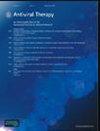Antiviral prophylaxis for hepatitis B virus in COVID-19 patients treated with immunosuppressive drug therapy
IF 2.3
4区 医学
Q4 INFECTIOUS DISEASES
引用次数: 0
Abstract
To The Editor, We read with great interest the review on COVID-19 and hepatitis B infection by Alqahtani SA and Buti M [1] underlining the need for screening and possible prophylaxis for HBV in patients with COVID-19 receiving corticosteroids and other immunosuppressive agents.The risk of HBV reactivation in patients with HBV surface antigen (HBsAg) /HBV core antibody (HBcAb)+ is estimated to be between 1 and 10% if they are taking moderate-dose (10–20 mg prednisone or equivalent) or high dose (>20 mg prednisone daily or equivalent) of corticosteroids daily for >4 weeks [2]. Hepatitis B virus reactivation can occur in HBsAg-negative patients who have only markers of previous exposure to HBV (HBcAb-positive with or without hepatitis B surface antibody [HBsAb]) [3].To investigate retrospectively the incidence of HBV reactivation in HBsAg /HBcAb+ patients, we reviewed the medical files of 450 patients with Covid-19 admitted at “Annunziata” Hub Hospital, a tertiary care hospital in Cosenza, Italy, between 6 March 2020 and 6 July 2021. Hepatitis B virus virologic indicators were determined at baseline. A total of 60 (34 males and 26 females; median age 69 year, range: 39–87) COVID-19 patients showed evidence of resolved HBV (HBsAg-negative, HBsAb-positive, HBcAb-positive). fifty-five of them patients had at least one comorbidity (most commonly hypertension, diabetes mellitus type 2, and cardiovascular diseases). Forty of the 60 patients met the criteria for severe COVID-19. Five were treated in ICU. Out of these 60 patients, all patients were given corticosteroids, 95 patients received tocilizumab, 40 patients received baricitinib, 30 patients were given anakinra, and 16 patients were treated with canakinumab. Hepatitis B virus virologic indicators were determined at baseline. There were no deaths. They all underwent antiviral prophylaxis with tenofovir disoproxil fumarate, for an average duration of 20 days (14–46 days). They also received antiviral therapy to treat the COVID-19 (remdesivir 50 and lopinavir/ritonavir 10 patients). Ten of those 60 patients had ALTabove normal range (i.e. >45 IU/L). In 12 patients with normal values of ALT at the time of admission there was a rise of ALT above normal range during hospitalization. With recovery from COVID-19, liver function gradually returned to baseline. None of the 60 patients with resolved HBV infection developed clinical evidence of HBV reactivation during 3–6 months of follow-up. We did not observe slower SarsCov2 viral clearance in these patients, while patients with higher HBsAb titers developed higher anti-SarsCov2 antibody titers. There were no adverse events attributable to anti HBV viral prophylaxis. Hepatitis B virus reactivation in subjects undergoing immunosuppressive treatment is recognized as a serious clinical problem. Although the risk of免疫抑制药物治疗新冠肺炎患者乙型肝炎病毒的抗病毒预防
致编辑:我们非常感兴趣地阅读了Alqahtani SA和Buti M[1]关于COVID-19和乙型肝炎感染的综述,强调需要对接受皮质类固醇和其他免疫抑制剂治疗的COVID-19患者进行筛查和可能的乙型肝炎预防。HBV表面抗原(HBsAg) /HBV核心抗体(HBcAb)+患者如果每天服用中剂量(10 - 20mg强的松或等量)或高剂量(每天20mg强的松或等量)皮质类固醇,持续4周,HBV再激活的风险估计在1 - 10%之间。乙型肝炎病毒再激活可发生在hbsag阴性患者中,这些患者只有既往HBV暴露标志物(hbsag阳性,伴或不伴乙型肝炎表面抗体[HBsAb])[3]。为了回顾性调查HBsAg /HBcAb+患者中HBV再激活的发生率,我们回顾了2020年3月6日至2021年7月6日期间在意大利科森扎的三级保健医院“Annunziata”Hub医院收治的450名Covid-19患者的医疗档案。基线时测定乙型肝炎病毒病毒学指标。共60只(男34只,女26只);中位年龄69岁,范围:39-87)COVID-19患者表现出HBV消退的证据(hbsag阴性、hbsag阳性、hbcab阳性)。其中55例患者至少有一种合并症(最常见的是高血压、2型糖尿病和心血管疾病)。60名患者中有40人符合重症标准。5例在ICU治疗。在这60例患者中,所有患者接受皮质类固醇治疗,95例患者接受tocilizumab治疗,40例患者接受baricitinib治疗,30例患者接受anakinra治疗,16例患者接受canakinumab治疗。基线时测定乙型肝炎病毒病毒学指标。没有人员死亡。所有患者均接受富马酸替诺福韦二氧吡酯抗病毒预防治疗,平均持续时间为20天(14-46天)。他们还接受了抗病毒治疗以治疗COVID-19 (remdesivir 50和洛匹那韦/利托那韦10例)。60例患者中有10例alt高于正常范围(即bb0 - 45 IU/L)。12例入院时ALT值正常的患者在住院期间ALT值高于正常范围。随着COVID-19的恢复,肝功能逐渐恢复到基线。在3-6个月的随访中,60例HBV感染解决的患者中没有出现HBV再激活的临床证据。我们没有观察到这些患者的SarsCov2病毒清除速度较慢,而HBsAb滴度较高的患者的抗SarsCov2抗体滴度较高。没有可归因于抗HBV病毒预防的不良事件。在接受免疫抑制治疗的受试者中,乙型肝炎病毒再激活被认为是一个严重的临床问题。尽管
本文章由计算机程序翻译,如有差异,请以英文原文为准。
求助全文
约1分钟内获得全文
求助全文
来源期刊

Antiviral Therapy
医学-病毒学
CiteScore
2.60
自引率
8.30%
发文量
35
审稿时长
4-8 weeks
期刊介绍:
Antiviral Therapy (an official publication of the International Society of Antiviral Research) is an international, peer-reviewed journal devoted to publishing articles on the clinical development and use of antiviral agents and vaccines, and the treatment of all viral diseases. Antiviral Therapy is one of the leading journals in virology and infectious diseases.
The journal is comprehensive, and publishes articles concerning all clinical aspects of antiviral therapy. It features editorials, original research papers, specially commissioned review articles, letters and book reviews. The journal is aimed at physicians and specialists interested in clinical and basic research.
 求助内容:
求助内容: 应助结果提醒方式:
应助结果提醒方式:


